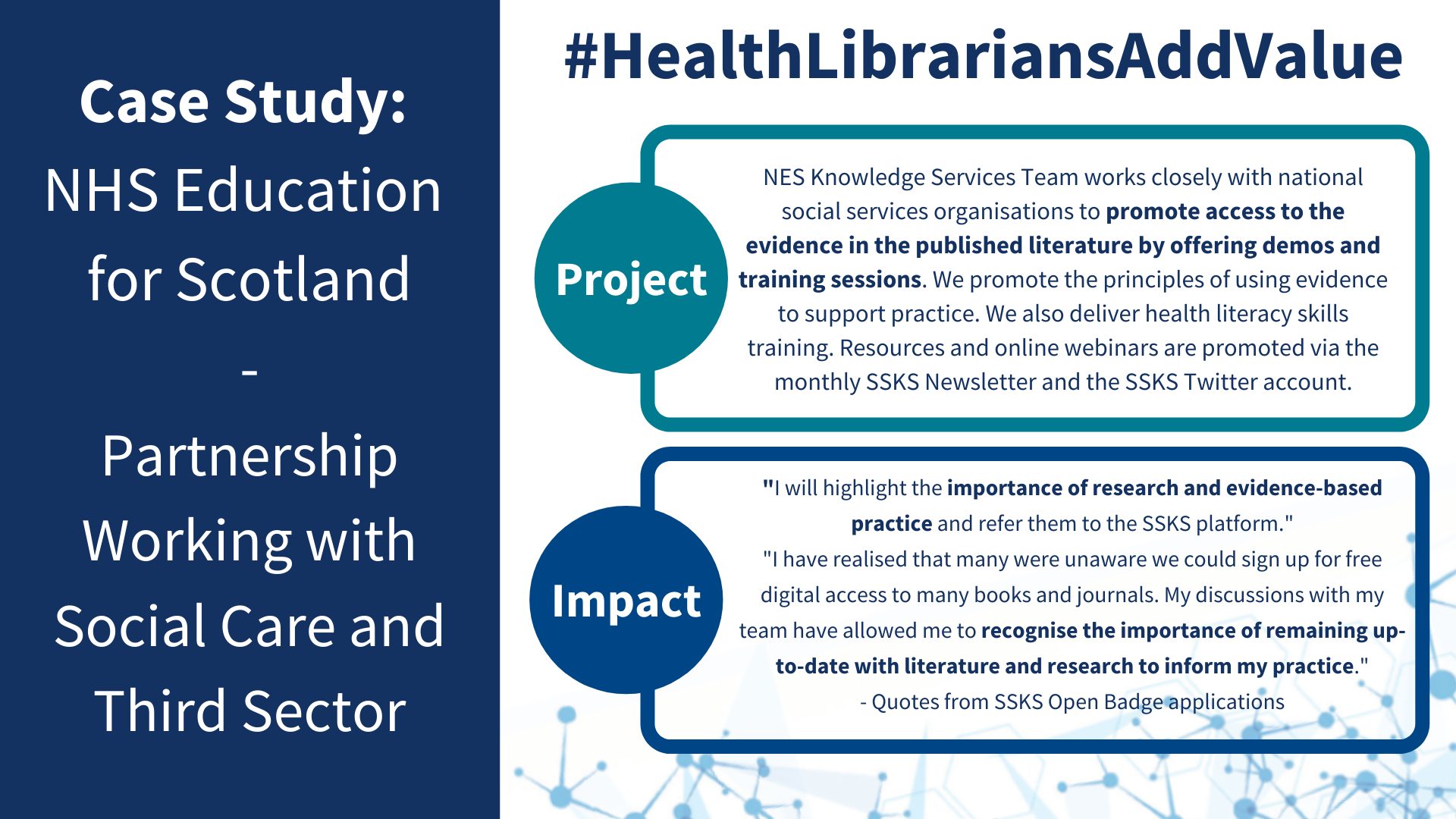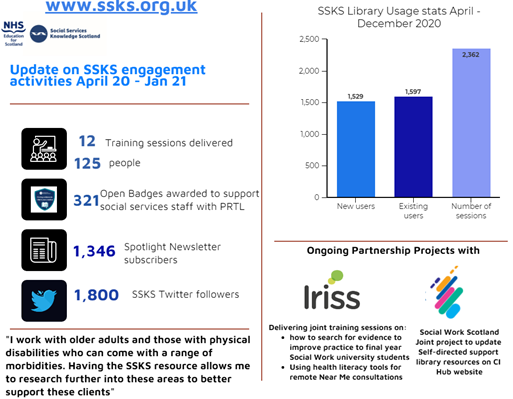Partnership Working with Social Care and Third Sector
This case study is part of Health Librarians Add Value, a campaign run jointly by NHS Education for Scotland (NES) and CILIPS. It has been provided by Annette Thain, Principal Lead, NES. Read other case studies here.
Outline of project
NHS Education for Scotland (NES) negotiates access to the digital library subscription resources for all health and social care staff in Scotland via The Knowledge Network and Social Services Knowledge Scotland (SSKS). The Scottish Government Office of the Chief Social Worker has funded posts in NES Knowledge Services Team for over 10 years.
NES Knowledge Services Team works closely with national social services organisations to promote access to the evidence in the published literature by offering demos and training sessions. We promote the principles of using evidence to support practice. We also deliver health literacy skills training. Resources and online webinars are promoted via the monthly SSKS Newsletter and the SSKS Twitter account.
Examples of our work include:
Care Inspectorate
- Maintenance of content and embedded links on Care Inspectorate Hub website
- Provide information skills training to promote the Care Inspectorate Hub and SSKS to demonstrate how the content complements each other
- Training for teams of inspectors and others
- Knowledge management projects with the Care Inspectorate Quality Improvement Teams
IRISS
- Promotion of the IRISS Evidence Search and Summary Service
- Host joint training sessions
- Jointly maintain Care Inspectorate Hub pages
SSSC
- Develop and promote open badges to social care staff. For the period April 20 to Jan 21, there were 321 badges completed.
Other organisations we have worked with:
- Learning Network West – delivered two information skills sessions to those undertaking PDAPL award and Independent Practice Educators.
- Scottish Council for Voluntary Organisations (SCVO) – Delivered a Digital Inclusion Event attended by 32 people in November.
- Alliance – working to update “Going in the Right Direction” and “Libraries – supporting your self-management journey” toolkits.
- Collective Force for Wellbeing SLWG -This is a collaboration with SLIC, the Alliance, Scottish Government Person Centred Care Team, DHI and COSLA to develop a 2 year plan to embed libraries as part of the health and wellbeing service landscape.
Quotes from SSKS library Open Badge submissions
1. When giving informal and formal supervision I will highlight the importance of research and evidence-based practice and refer them to the SSKS platform.
2. … To make my colleagues aware of SSKS I will create a display within my nursery that will allow them to refer to the learning and development of their practice to ensure the best outcomes for each child are met.
3. I searched the library for an article… at the team meeting on Friday, I will discuss how we could use SSKS to help us with our continuous professional development.
4. … I found information from this to be helpful and informative for my role as senior support worker to the Learning Disability team.
5. I will show my colleagues how to use the library to source material that can be useful in your line of work. The articles sourced using the SSKS library can then be shared with the rest of the team adding to how we can improve our practice.
6. … I believe SSKS will be used in all future working groups within my service.
7. Alcohol-related dementia… This article was interesting as it showed how the misunderstanding of terminology can impact on the diagnosis that individuals receive.
8. One thing I can do to make my colleagues aware of SKSS is to discuss the website at a team meeting and/or create a poster for the office. I would also send this poster out to the team via email as most of my team are currently working from home. After discussing the website with my colleagues, I have realised that many were unaware we could sign up for free digital access to many books and journals. My discussions with my team have allowed me to recognise the importance of remaining up-to-date with literature and research to inform my practice.
Recent feedback demonstrating how this learning is having an impact on day-to-day practice in a social services setting:
“I work with adults who present with some learning difficulties. I have learnt through this health literacy that chunk and check can be used alongside teach back. For effective communication to take place, I have to break down information into smaller chunks throughout discussions and check for comprehension along the way. This is better than trying to expect the clients to remember all the information you have passed on at the end of a discussion. The other thing I will do in my place of work is to try and use simple language to explain things for a better understanding. With my client group, the use of graphics and pictures will be very useful in explaining concepts that others can find easy.

